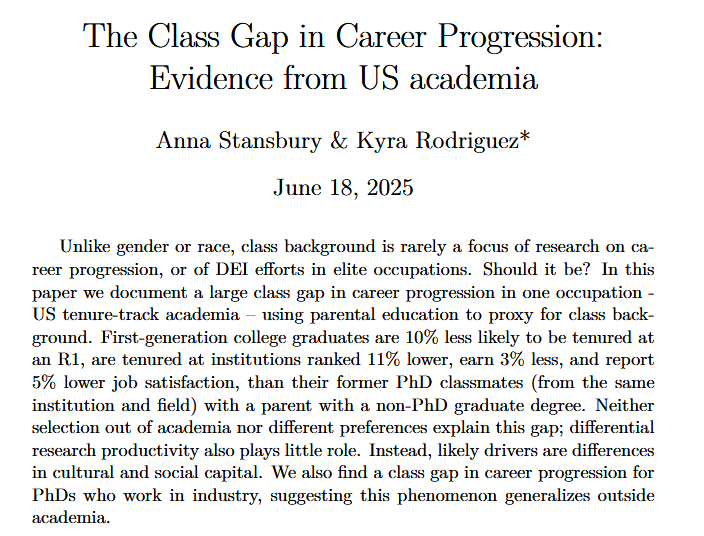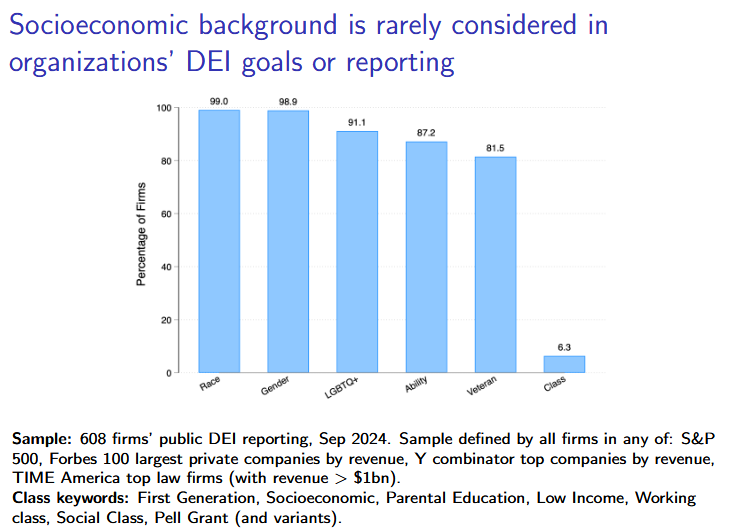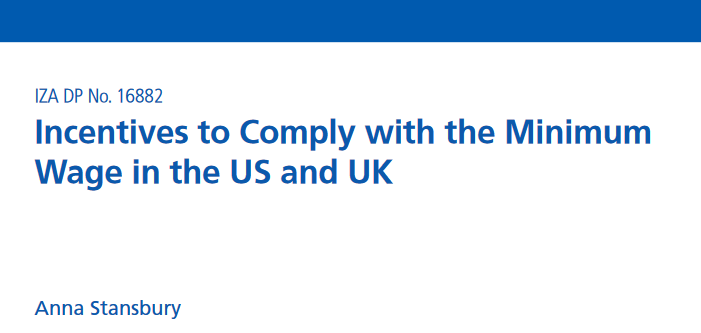We know that economics has a gender and racial diversity problem. Socioeconomic background is less often discussed.
@SchultzzyRun and I use the Survey of Earned Doctorates - a census of all PhDs from US institutions - to study the socioeconomic background of econ PhDs
(1/N)
@SchultzzyRun and I use the Survey of Earned Doctorates - a census of all PhDs from US institutions - to study the socioeconomic background of econ PhDs
(1/N)

To proxy for socioeconomic background, we use the highest level of parental education.
In this preliminary work, we're focusing just on US-born individuals (30% of US econ PhDs) since parental education means diff't things for SES across diff't countries. (2/N)
In this preliminary work, we're focusing just on US-born individuals (30% of US econ PhDs) since parental education means diff't things for SES across diff't countries. (2/N)

Key stylized fact:
Amongst US-born PhDs, Economics is less socioeconomically diverse than *all* the major PhD fields, including math, computer science, physical and biological sciences, and other social sciences.
(3/N)
Amongst US-born PhDs, Economics is less socioeconomically diverse than *all* the major PhD fields, including math, computer science, physical and biological sciences, and other social sciences.
(3/N)

This puts economics at or near the bottom on gender, racial/ethnic, and socioeconomic diversity among US-born PhDs.
The correlation btw diversity metrics is strong -- suggesting that the same kinds of factors may be leading to lack of diversity across all these metrics.
(4/N)
The correlation btw diversity metrics is strong -- suggesting that the same kinds of factors may be leading to lack of diversity across all these metrics.
(4/N)

Note that the axes of racial/ethnic and socioeconoimc diversity are related but not the same. Within major racial/ethnic groups economics remains the least socioeconomically diverse. In econ, most URM economics PhDs are not first-gen, and most first-gen PhDs are not URM.
(5/N)
(5/N)

Part of the diversity issue may come from the fact that economics draws its US-born PhDs from a more advantaged undergraduate population. The share from public institutions is lower than the other major fields, and the share from an Ivy Plus institution is the highest.
(6/N)
(6/N)

@toddrjones and Sloan show that half of tenure-track faculty at economics PhD-granting institutions in the US come from the 15 "top-ranked" PhD programs.
So, it's important to note that these programs are even less socioeconomically diverse amongst US-born individuals.
(7/N)
So, it's important to note that these programs are even less socioeconomically diverse amongst US-born individuals.
(7/N)

We've been comparing to the population of PhDs. But it's even starker when comparing to the general population. With so little diversity of socioeconomic background, what are we missing when we study topics like inequality, poverty, unemployment, access to opportunity?
(8/N)
(8/N)

This is still work in progress - we just presented today at the Fed's diversity & inclusion conference and will be putting out a longer and more detailed working paper over coming weeks.
All your comments, thoughts, and feedback are welcomed!
(/End)
All your comments, thoughts, and feedback are welcomed!
(/End)
https://twitter.com/FedResearch/status/1458077296422756365
• • •
Missing some Tweet in this thread? You can try to
force a refresh

















